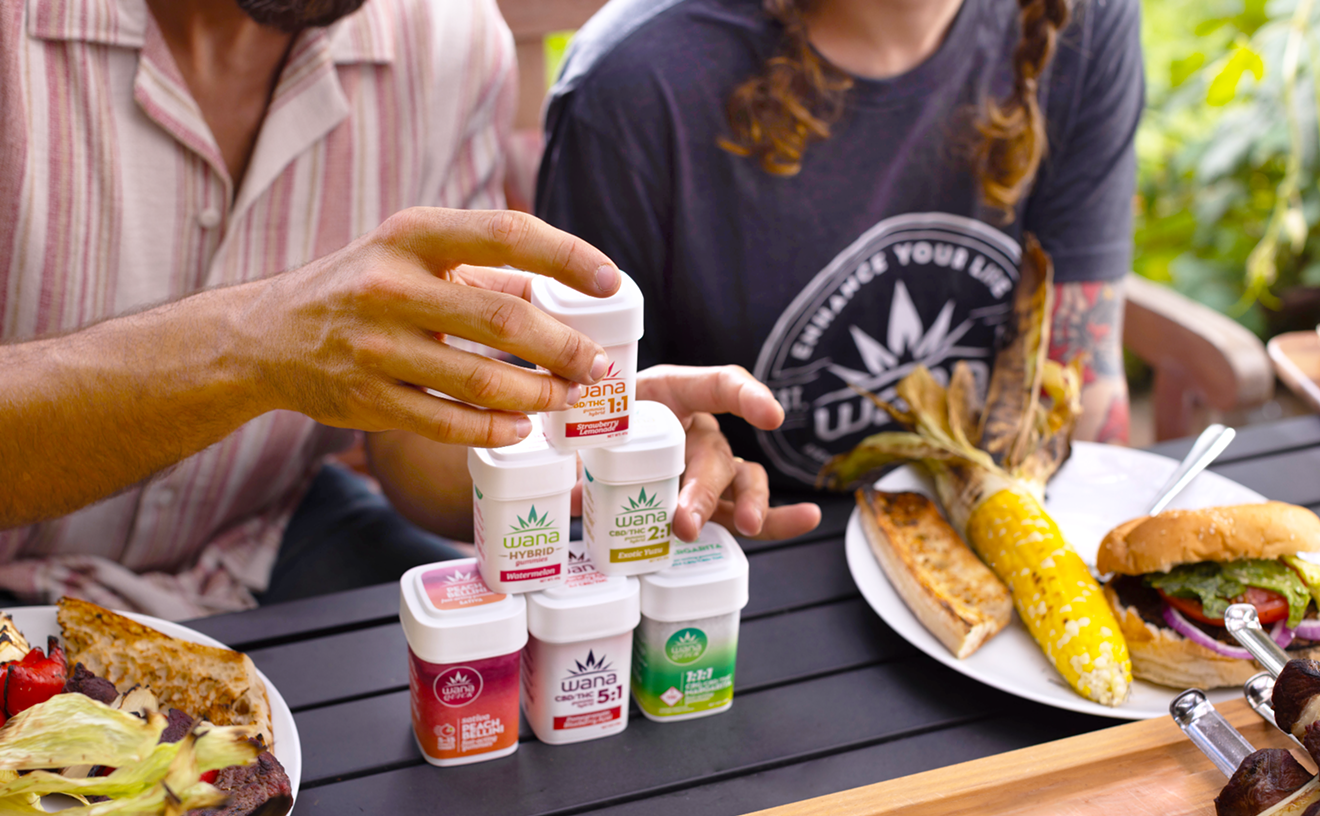All that growth brings a growing demand for energy and other resources, however. Cannabis business analytics firm New Frontier Data recently released a report showing that electricity consumption by America's pot industry will increase by 162 percent by 2020, with the industry currently consuming 1.1 million megawatt hours of electricity annually, or enough to power 92,500 homes for a year.
To combat inefficiency and shape a more eco-friendly future, the Cannabis Certification Council continues to hold an annual sustainability symposium in Denver, and the Denver Department of Public Health and Environment serves as the event's organizing sponsor. Topics such as water use, outdoor growing, package recycling and electricity were all discussed during the conference on Friday, October, 26; here are five pressing sustainability issues before the pot industry right now:
Pest Control
Cannabis growers face two major obstacles that other farmers don't. Because of pot's federally illegal status, the pesticides that have been used on the plant for years were meant for other crops...most of them fruits and vegetables, not something humans smoke. "We're not smoking broccoli and potatoes," points out Washington commercial cannabis grower Casey Connell. To be on the safe side, Connell recommends using bugs — and in most cases, more than one species — rather than pesticides at cannabis grows.
Connell employs ladybugs and certain types of dirt mites and parasitic wasps to eat aphids, spider mites and other pests that can ruin a harvest, building a little ecosystem around his plants for protection. As with an aquarium or other small slices of re-created nature, though, you need to be sure the animals get along. "Some bugs will eat anything, including other bugs that are fighting something else," he notes.
Outdoor growers can amp up the protection, too. Robert Trotter, who operates a sustainable outdoor grow on his ranch in Eagle County, mixes nematodes in his plant soil to combat pest larvae, and he takes advantage of indigenous pholcidae (daddy long legs) for further pest protection.
Cannabis Extraction Waste
It's not quite lagoons full of pig shit, but the cannabis industry is facing a growing waste problem, especially after extraction processes. According to Andrew Livingston, director of economics and research at cannabis law firm Vicente Sederberg, the plant matter left over from extraction processes used to make butane hash oil and other solvent-based concentrates can't be disposed of in landfills, because it's toxic and, in some cases, flammable. "We don't have a hazardous flammable [liquid] waste disposal site here in Colorado," he explains. "Colorado is still sending this waste to other states."
The Colorado Marijuana Enforcement Division and pot enforcement agencies in other states require extractors to make their cannabis waste and extraction byproducts "unusable" by mixing them with something that makes the result virtually impossible to consume. Extractors and cultivators alike often use bleach, cat litter or other toxic substances to make their pot waste unusable, Livingston notes, but none of those concoctions can be composted or recycled. Livingston suggests that research is needed to find new ways to reuse or minimize the amount of unusable cannabis waste. "There are some things that just aren't recyclable, but that's something we still need to figure out," he says.

Cannabis grows can produce volatile organic compound gases that are dangerous when mixed with nitrogen or other gases that are common in urban areas.
Jacqueline Collins
Any commercial industry has a carbon footprint, and cannabis is no different. But because the industry is so new, its participants have a chance to dissect their carbon footprints before getting entrenched in bad practices, according to Sustainabis president Jacob Mitchell. He analyzes carbon footprints for cannabis businesses, outlining their energy and water use as well as waste output and other environmental factors, and how climate change could affect them. "It takes a lot of mapping out, but consumers care about carbon footprints," he says. "And many factor it into their purchasing decisions."
Kaitlin Urso, environmental protection specialist for the Colorado Department of Public Health and Environment, says the carbon emissions from cannabis grows don't appear to be anything major, but adds that those in urban areas could produce volatile organic compound gases that cause pollution when mixed with nitrogen and other emissions found in city environments; she points out that many of Colorado's grows are concentrated in Denver's industrial warehouses. The CDPHE is currently conducting a study on the cannabis industry's impact on air quality in Colorado, Urso says, and expects to finish the report soon.

STO Responsible uses a biodegradable plastic that disintegrates without creating microplastics.
Courtesy of Grasslands
Product packaging has always caused headaches for the industry, but most of those frustrations come from the regulatory side, which has seen changing requirements for childproof standards and warning labels. But now the attention has moved to eco-friendly packaging, especially as disposable vaporizer cartridges get more popular among cannabis consumers.
One way to combat packaging problems is setting up recycling centers at dispensaries, similar to those for grocery bags at supermarkets. But can more be done? A handful of symposium speakers want to see all vaporizer cartridges become refillable, while others want packaging to be easier on the earth. One new cannabis packaging company, STO Responsible, has created a biodegradable plastic package for pot products, which should meet all childproof requirements without filling landfills for extended periods of time. The plastic that STO uses has an enzyme activated by oxygen, which breaks down the material in five to ten years instead of 500, and doesn't create the microplastics currently wreaking havoc on our environment.

Both hemp and cannabis can create textiles, paper and biodegradable plastics.
Sirirak/iStock
A lot of cannabis companies are wasting tons of recyclable fibers by throwing out their plant stalks and stems... but not because they want to. The rules vary from state to state, but many commercial cultivators aren't allowed to recycle marijuana stalks — which, like hemp stalks, are rich in fiber that can be used to make textiles, paper, biodegradable plastics and other materials.
"The only difference between marijuana and hemp fibers was created by man," explains cannabis and hemp lobbyist Cindy Sovine, who says that the currently accepted definition of hemp — and its limit of 0.3 percent THC — is the only thing differentiating marijuana and hemp fibers. "If not for 0.01 percent, any marijuana and hemp plant are the same in that regard."
However, Colorado pot growers will soon be able to recycle those fibers thanks to the passage of HB 187 by the Colorado General Assembly last session.The new law allows growers to send their stalks to registered recycling companies — and according to Sovine, the hemp industry welcomes the new competition. "The hemp industry can fill the demand for all this bio-mass, and welcomes help from cannabis companies," she says.














